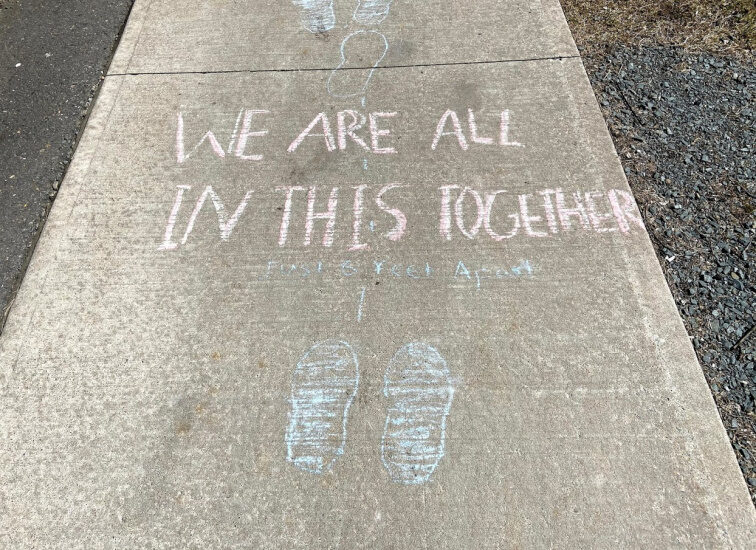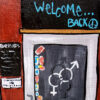
KJIPUKTUK (Halifax) – I meant to write this seven or eight weeks ago, soon after the pandemic hit, but somehow time seemed to turn into jelly. That when all of this was fresh, weird, surprising. When I walked past the cafes and indie organic markets that make Halifax so convivial, and saw handmade signs tapes to the doors: “Temporarily closed. Be safe!” When I snapped photos of shoppers standing stretched several feet apart in the Superstore because it was so startling. When I stopped in a little gourmet shop on Gottingen, bent over to peer at the cheese behind the glass and was told to step behind the green tape – or be fined a few hundred and the shop owner $7000.
At first it was a novelty. There was a whiff of World War II on the home front, the sacrifice and solidarity: front line soldiers in protective gear trudging off to do the most essential and dangerous work, while civilians stayed home and did a lot with little. The little, here and now, meant supermarket shelves emptied of cans of tuna and soup, pasta, spaghetti sauce, toilet paper, liquid soap, hand sanitizer and the ingredients of baking – flour, yeast, chocolate chips. The news was filled with increasingly dire statistics of infections and deaths – in Nova Scotia, the positive Covid-19 cases rose steadily and elsewhere, in Quebec, Vancouver, Toronto and especially New York City – the cases and the deaths were skyrocketing.
I live by myself in an apartment in the North End, and am looking for a job. Usually, I walk to Café Lara or Java Blend for a latte, and to the library to work on my laptop and meet friends at Pavia. I buy groceries at Local Source and the Warehouse market on Isleville and on, Saturdays, pick up veggies at the Brewery farmer’s market and get together with friends at Trident for coffee. Evenings, there are poetry readings and classes and music and hanging out. It was all easy, familiar, friendly – but in a day or two, all of this was shut down.
Soap — I never knew it broke down cell walls. Numerous news stories explained the chemical action of suds and demonstrated the technique – front, back, between fingers, tips of fingers, thumbs, wrists, rinse, rinse, dry – 20 seconds, two Happy Birthdays, a song that is irritating even once a year, let along six or eight times a day. I rarely left my apartment: only to dump my trash, buy groceries, and take walks. Most days I took my walks around the outside of the Common – the parks were shut, too – and veered way around other strollers, averting my head as they did theirs. Home, I immediately washed my hands for 20 seconds with lots of soap. Only when I shut my apartment door did I feel safe again from infected air.
Keep to a schedule, said the friends I called and every lifestyle story on the news. Imbued with purpose, I followed Lee Holden’s 20-minute morning chi qong lesson on YouTube, stretching and pounding my chakras. I let bananas ripen black for the ubiquitous banana bread and soaked beans for soup. I watched the HD operas that the Metropolitan Opera was offering free on its website: the Ring Cycle and Nixon in China — surreal seeing Dick and Pat’s resonate singing.
Then the zoom boom opened up. Zoom meditation hours – I settled on two, 10 am and 8:45 each day, joined by people around the world. A Monday night dharma class on zoom. Country music extravaganzas on my laptop. Zoom gatherings with old college friends who hadn’t been in the same conversation for 30 years – I felt a craving to catch up. A zoom dinner party – I had Mirchi deliver samosas and paneer butter masala to the guests and we all ate together. Oedipus Rex with Frances McDormand and Oscar Isaac, the actors wearing t-shirts in their living rooms, but giving an emotional performance that unexpectedly seemed so relevant: we have angered the gods with our arrogance. We must hit the lowest ground and begin again. We must see ourselves for who we really are and heal ourselves and the world’s environment we have trashed.
And the news. Mesmerizing everywhere, but in New York, my home for 20 years, it was heartbreaking: lonely deaths, morgues so full that refrigerated trucks served the overflow, group graves. I read the news obsessively – the Chronicle Herald, the Globe and Mail, the Washington Post, the Guardian, CNN, on and on. Andrew Cuomo’s daily briefing became a lodestar. Is the cure worse than the disease? he was asked. Economic stress, very bad, he said. Mental health problems, increased domestic violence, very bad. But they’re not death. “Staying home, what did we accomplish?” he said. “One hundred thousand fewer infections in the state of New York. That’s what we did. That’s what we’re doing…Maybe the life you saved is not your own. Ok. You still saved a life. And that’s not a bad way to spend one day. Or 56 days.”
Meanwhile, Strang and McNeil, in their briefings, seemed straightforward and clear, and Canada’s officials and measures, far from perfect, emerged as shimmeringly sane compared to those of the U.S. president, he who I’d rather not even name. Nova Scotia’s new Covid-19 cases rose steadily, up to nearly 50 on the worst day, and then gradually flattened and fell. But Northwood retirement and disability home, a few blocks away from my apartment, was – and is — a disaster, another heartbreak, currently with 52 of the province’s 58 deaths. Seniors and disabled people – the vulnerable, together, often in shared rooms, in what became a petri dish for the virus.
Staying home became a patriotic duty, our war effort. Counterintuitively, any activity that meant going out and doing anything, however useful, was discouraged. So I drew up ambitious plans for all this free time. I would finally read Middlemarch. I would study Buddhist philosophy. I would write every day and accumulate many pages of my memoir. I would do some elaborate baking and distribute the results to neighbors.
Instead, after a week or so, my efforts to be wholesome, cheery and energetic, at home, alone, tanked. I spent hours sitting in bed, watching Netflix and Prime. Dee Dee’s started sidewalk pickups and my evenings frequently consisted of a bowl of Shaker Lemon or Mexican chocolate, a few droppers of indica cannabis oil, and binging on Outlander and Schitt’s Creek. I called friends, hungry for contact, but welcome as the voices were, the conversations were short – so little was going on, there wasn’t much to say. And somehow, even doing so little, I was kind of exhausted.
And there passed 66 days.
Three days ago, finally, it felt like real spring. I met a friend for a distance walk to Federico’s friendly little espresso stand on Isleville — take-out, no chairs — and we ran into two other people we knew. As we stood several feet apart and talked and laughed, I realized that that I hadn’t had gathered together with friends, in person, since March 15. At home alone, I’d swallowed my loneliness and longing for other people, for friends and easy talk, trying to ignore those feelings. But slaking that thirst for only that 20 minutes felt so wonderful, such a relief, and once home again, it broke open longing for more contact.
Today, it’s spring-warm again, too, and tomorrow will be even warmer. The Public Garden is flowering, beautifully. But we still need to be in lockdown, even if it’s a modified one. I am totally sick of zoom and my laptop screen, even though they are crucial right now. I bought two masks, pink and red, from Lillian’s downtown — accordion-pleated ones let me breathe. I wear them to shop and downtown and wash them immediately when I get home. I am sending out resumes to jobs that may well have evaporated. I am getting through day by day but the future – even a month ahead – seems opaque. I have no idea nor does anybody I know, what our lives, our money, our jobs, and our world will look like by fall. All I can do is keep getting through the days, and be patient with myself when my heart sinks and all I want is to stare at Netflix and not think too hard.
Barbara Elizabeth Stewart is a writer and university teacher who worked in New York City, India, Bhutan and the United Emirates. She moved to Halifax two years ago.
With a special thanks to our generous donors who make publication of the Nova Scotia Advocate possible.
Subscribe to the Nova Scotia Advocate weekly digest and never miss an article again. It’s free!



